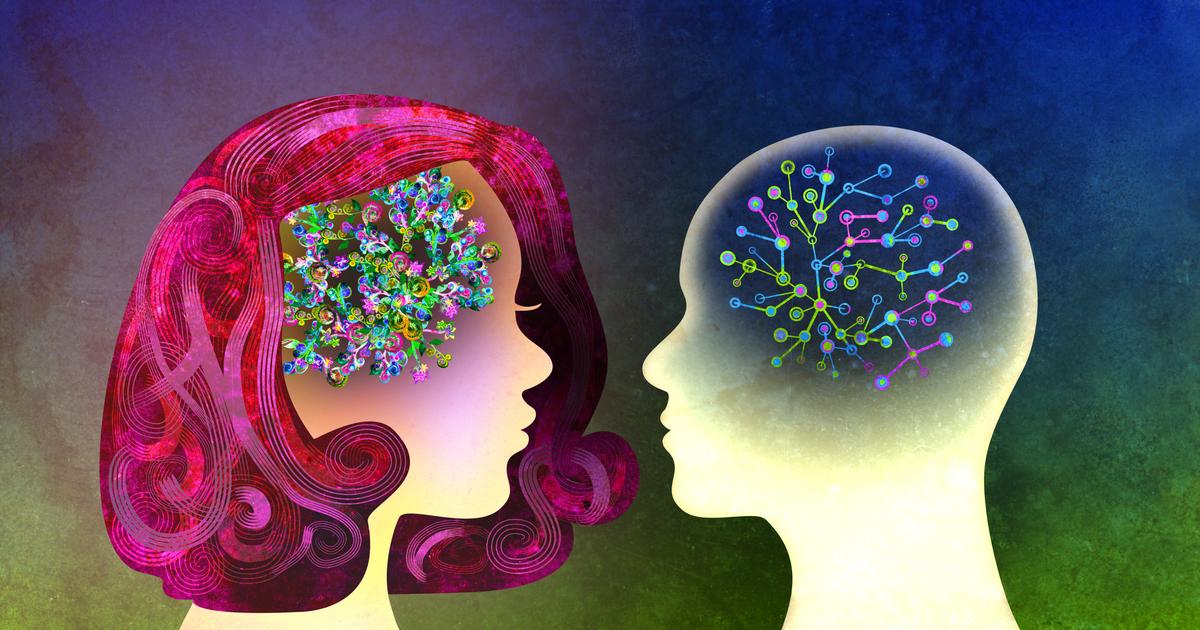in
solaris
, Stanilslaw Lem's novel, the crew members of an alien observation station try to communicate with an intelligent being very different from the known ones.
A protoplasmic ocean, which appears alive but is impossible to interact with, reminds us how narrow our imaginations can be when we think of alien intelligence.
Ricard Solé (Barcelona, 60 years old), a researcher at ICREA (Catalan Institute for Advanced Research and Studies) and director of the Complex Systems Laboratory at Pompeu Fabra University in Barcelona, studies, among other things, the existence of "spaces of cognition” that go beyond solid brains like humans.
The difference between that organ, "with the neurons placed in one place and connected to each other, with respect to liquid brains,
This reflection on the definition of intelligence or consciousness is also present in the
Brains exhibition
,
of which he is commissioner.
The exhibition, which can be seen at the Espacio Fundación Telefónica in Madrid until June 2023, is also organized by the Barcelona Center for Contemporary Culture (CCCB) and the Wellcome Collection in London, and explores how art, science and Philosophy have studied and represented the brain throughout history.
From the first great revolution in neuroscience, carried out by Santiago Ramón y Cajal, to the current work, which unites the efforts of engineers, mathematicians, physicists and biologists to understand an organ as complex as the cosmos, this search is the inquiry into what it means human being, but also about neurological diseases or the fears and possibilities generated by artificial intelligence.
Ask.
Will neuroscience allow us to answer questions about what our nature is, why we seek meaning in life, or whether we are special beings among animals?
Reply.
On the one hand, I think so, sooner or later we will end up understanding these things.
In all that biosphere that is not human there are precursors of consciousness and intelligence, but I think that humans are unique, because of the complex language or the ability to understand the emotions of the other.
And also because we are mental travelers in time.
We can access the past in a very rich way and we can imagine many possible futures.
That combination gives rise to something unique and strange, to our ability to think of ourselves and to know that we are perishable.
Q.
But there are other animals capable of recognizing themselves or of having a certain idea of what it means to die.
R.
That is difficult to say.
But yes, there are very important precursors of what makes us humans special in other animals, such as recognizing ourselves in a mirror, as in the case of elephants.
We know that they grieve when someone close to them has died.
They feel that pain that is not physical.
That is very important, both from the point of view of recognizing rights in animals and to understand our origins and the origin of the human mind.
Q.
In the exhibition there are reproductions of the cave paintings, which are a sample of the moment in which the modern human mind arose.
How do you think the emergence of that mind occurs?
R.
Nobody knows.
It is said that the mind and language do not leave fossils, but those paintings from Lascaux or Altamira are a bit like a fossil that indicates that the mind was already there.
And you see images that seem to be moving, as if it were a narrative, indicating that the narrative mind was already there.
How does this emerge?
Language allows something very relevant, and that is that genetic information, an inheritance based purely on genes, is replaced to a great extent by information, which allows others to be taught, telling a story that will remain after the death of the person who gave it. account, and it would open the door to other revolutions, such as our ability to create technology.
This changes our relationship with nature, turns us into engineers of the biosphere, something that animals like termites or ants also do,
but in a different way.
Those changes would start out slow at first, but when you couple something as revolutionary as language with the ability to understand time, it causes change that accelerates.
P.
Noam Chomsky proposed that human beings are born with a neural structure that makes it possible to learn a language, which then takes shape depending on the culture or country in which one is born.
There are people who still think that the human brain is like a blank slate on which you can draw anything, that culture is everything and that there is no basic human nature that conditions us.
Is this debate over for neuroscience?
R.
It is not a closed matter.
We have a very big brain and we consider ourselves very intelligent, but if you isolate a human from culture and language, which is like a kind of virus that infects brains, you are left with a totally stupid individual, because what capacity does he really have to handle himself? in your environment without having learned before the rest?
Solé, in the Barcelona Biomedical Research Park.Albert Garcia
Q.
Technology changes our environment and that ends up changing our minds.
Can artificial intelligence do that?
R.
Artificial intelligence, which is now very topical, is almost 40 years old.
The ideas that are now developing very quickly already existed, but now we have huge masses of data.
There are very powerful results, like when we see how they internalize and imitate the style of a painter like Van Gogh, but we are extremely far from creating an artificial brain, a creative mind.
We see it with what has now come out of ChatGPT, this system that uses natural language.
If you play around with these systems for a while, I think disappointment is inevitable.
The really creative, interesting part, which handles really original concepts, is not there.
Q.
The humans who painted Altamira and the members of primitive societies in general needed a wide variety of knowledge to survive.
Now we are very specialized, we receive a salary for a very specific job and then we get everything through large-scale social cooperation.
How do you think this highly specialized lifestyle and exposure to technologies like screens, which have reduced our ability to pay attention to complex subjects for a long time, will affect us?
Can this be reflected in physical changes in our brain?
A.
The physical changes in the brain happen on a very large time scale.
Yes, I will say that to me, who grew up in a more traditional education system, in which you had to invest time in thinking, in using your memory, and writing an essay required you to reflect on different parts of a problem, I It causes some concern that this could be lost.
Neuroscience has taught us that the paper book, to learn, understand, memorize or establish relationships between parts of a speech is much more powerful than any digital medium.
Despite the talk about how wonderful digital media are, for education that is far from true.
Q.
Is there a scientific interpretation of the meaning of dreams, is it known what function they fulfill?
R.
Explained in a very general way, we know that dreaming is important to settle and filter memories.
Of all the enormous amount of information that we receive every day, the brain filters during sleep at the molecular level, which from an evolutionary point of view is a way of making sure that your understanding of the world is correct, that you don't You are going to confuse when someone approaches you and you do not know if it is a predator or a family member.
Francis Crick had a rather funny-looking theory about dreams.
We have this evolutionary legacy of cleaning up memories and, furthermore, anything that happens in our environment has to have a narrative logic.
When we sleep or are dreaming, and this is conjecture, the idea is that in this filtering process we do not simply see images,
but we go through stories, perhaps because the narrative mind is always there.
What Crick was saying a bit jokingly was that, if that's true, the worst idea we can have is to go to the psychoanalyst to explain what we have dreamed, because the brain has been trying to eliminate things that we are going to reinforce.
To some extent it's a joke, but I think there's something to that.
Q.
Some scientists have considered developing a theory of mind through the common myths told by many primitive peoples who have never had contact, but even so, they tell very similar stories.
Makes sense?
A.
All humans on the planet share neural architecture.
That means that we share a way of understanding our environment, a way of having expectations.
Because the brain is largely a system for making predictions and having very clear expectations.
If I look at something that looks like a face to me, it will be a face to me.
Culturally, the fact that cultures recurrently have expectations of a certain type or create myths of a certain type, or even end up building societies of a certain type, it is possible that it is unavoidable due to the very nature of evolution that has led us here.
You can follow
EL PAÍS Salud y Bienestar
on
,
and
.
Subscribe to continue reading
Read without limits
Keep reading
I'm already a subscriber


/cloudfront-eu-central-1.images.arcpublishing.com/prisa/MNACP55MFZEWDPW5ELRNS5IENE.jpg)












